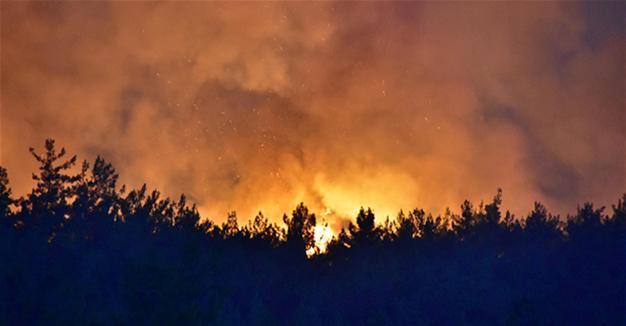Forest fires continue to engulf Turkey’s western, southern coasts over past three days
ISTANBUL/İZMİR

Amid a sweltering heatwave in Turkey, forest fires in the country’s western and southern coasts have been ongoing over the past three days, with hundreds of hectares of forest land already burnt to ashes.
Around 800 hectares of forest land were burned to ashes as the fire in the Menderes district of the Aegean province of İzmir continued to rage on its third day on July 3.
Eleven firefighting helicopters and four amphibious airplanes took off in the early morning hours to battle the fire raging in steep forest lands.
Officials said there was no risk that the fire would spread further, as around 80 percent area had been encircled.
İzmir Mayor Aziz Kocaoğlu said on July 3 that around 85 percent of the fire had been taken under control according to data from the forestry regional directorate.
He added that the fuel of a firefighting helicopter which had crashed into a dam on July 2 in the region while water filling would not contaminate drinking water.
Firefighting efforts in the region are ongoing to contain the fire.
Speaking to reporters late on July 2, forestry general directorate head İsmail Üzmez said there was no solid information regarding claims that glass bottles caused the fire, but said he believed it was manmade.
Accordingly, he urged citizens to properly clean up the area in forest lands after having picnic.
Üzmez also stated that forest fires broke out at a total of 147 spots across the country over the past three days.
Separately, around 200 hectares of calabrian pine trees have also been damaged in a forest fire in the Anamur district of the Mediterranean province of Mersin so far, as the fire was taken under control on its third day. Firefighting efforts also resumed in the early hours of July 3.
“We are intervening in the fire with three helicopters, 46 sprinklers, 20 water trucks, 200 forest employees, 25 technicians and nearly 100 villagers. The fire, which is partly under control, is now continuing at a single spot. Around 150 hectares of calabrian pine trees have been damaged,” Yılmaz said, adding that there were no reports of casualties or material damage.
Another forest fire in the Ezine district of the western province of Çanakkale that broke out on July 2 has also been ongoing for two days, with 30 hectares of forest land having been burned to ashes so far.
Çanakkale head of the forestry directorate Refik Ulusoy said 30 hectares of forest land had been damaged, according to preliminary examinations.
“Our teams are trying to open roads with dozers. We are also trying to get into the fire in order to block its way. Cooling works with sprinklers have also begun on the other hand. The intervention from the land has been ongoing as of midnight. Firefighting helicopters also began their works in the dawn.
Elsewhere, a forest fire in the Kaş district of the Mediterranean province of Antalya was nearly brought under control on July 3, on its second day, according to a top official.
Mustafa Türk, the head of Antalya forestry directorate, said the fire had been showing its effects on around 30 hectares of forest land, and had largely been brought under control. He added that one helicopter was ready to intervene in case of any fire danger.
More than 20 sprinklers, four dozers and many forestry directorate employees participated in the firefighting efforts.
He also noted that four different forest fires erupted across the province on July 2 but all had been extinguished. However, Türk stated there were potential risks for other fires due to weather conditions, urging citizens to stay cautious.
In addition, neighboring Greece was also hit by the heatwave, with several regions recording temperatures of 43 C, including Athens where the environment ministry said ozone levels were very high, Agence France-Presse has reported.
Many of the city’s residents left for the weekend and those who remained behind invaded the nearby beaches to cool down.
The heat also affected Bulgaria where five people died in the capital Sofia on July 1 due to soaring temperatures, with the temperature peaking near 44 C, hospital sources said.
 Amid a sweltering heatwave in Turkey, forest fires in the country’s western and southern coasts have been ongoing over the past three days, with hundreds of hectares of forest land already burnt to ashes.
Amid a sweltering heatwave in Turkey, forest fires in the country’s western and southern coasts have been ongoing over the past three days, with hundreds of hectares of forest land already burnt to ashes.